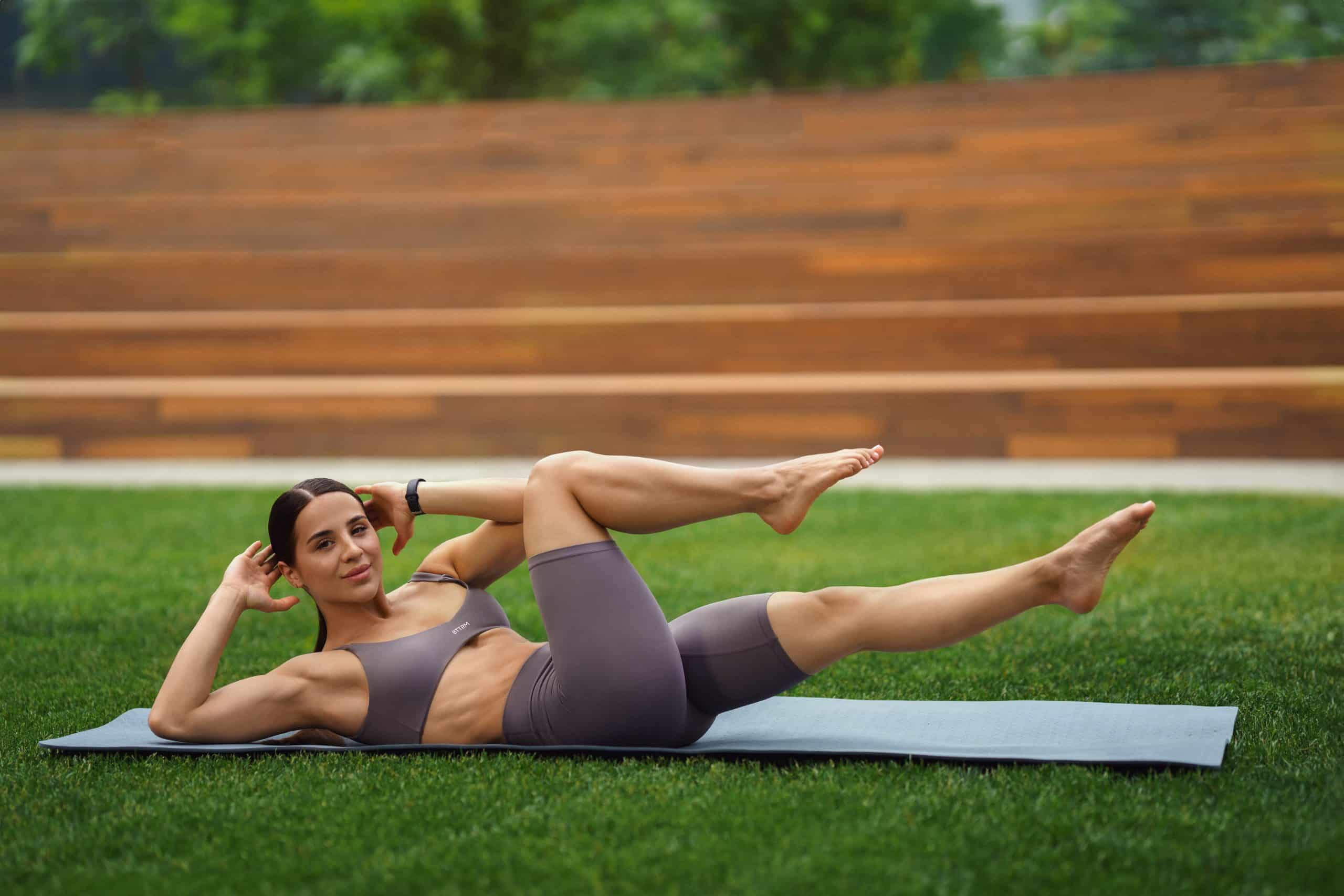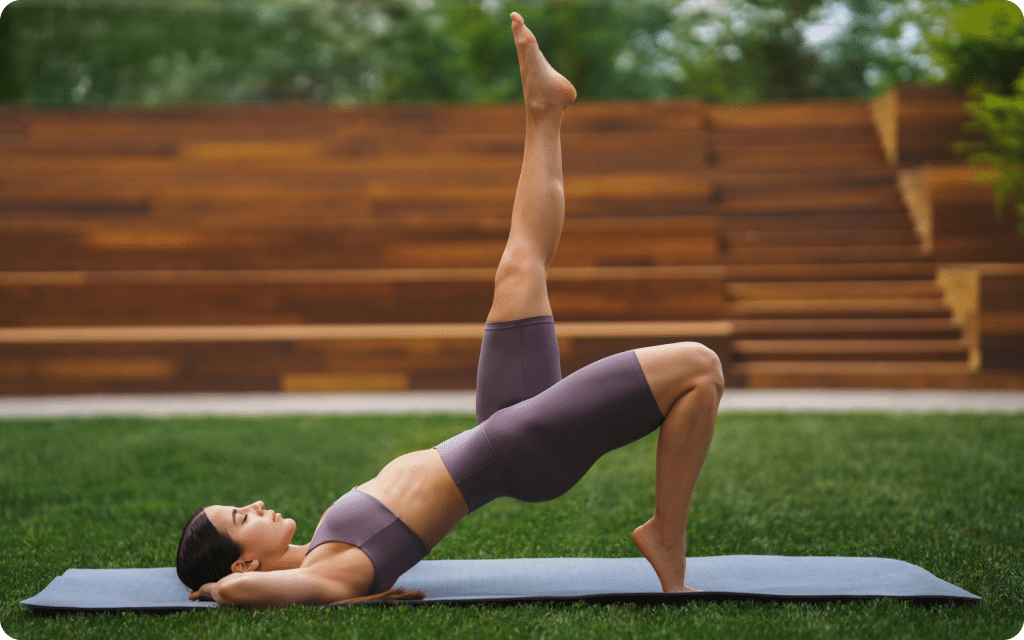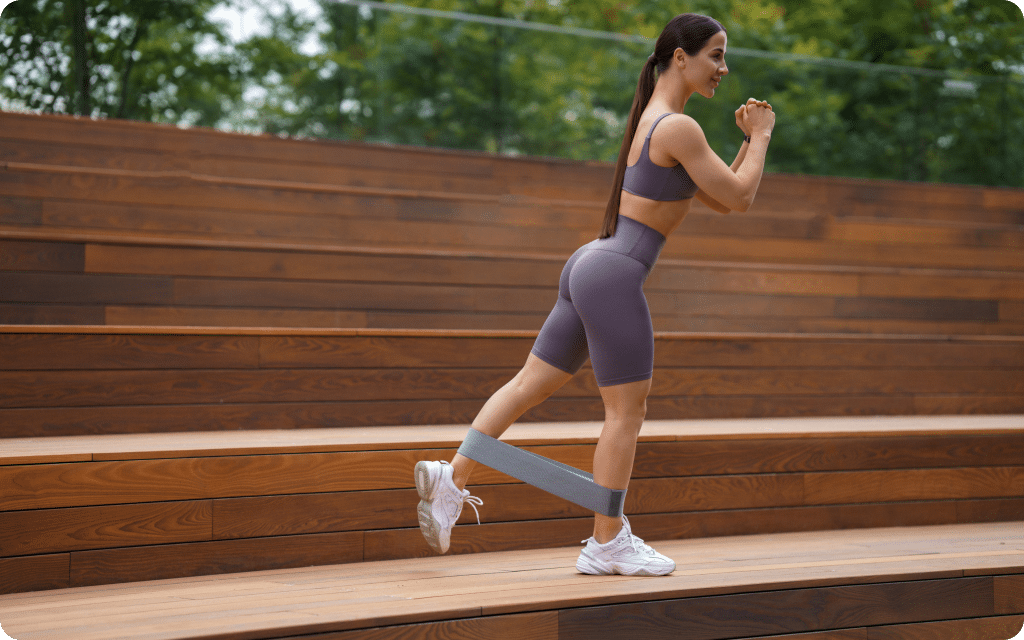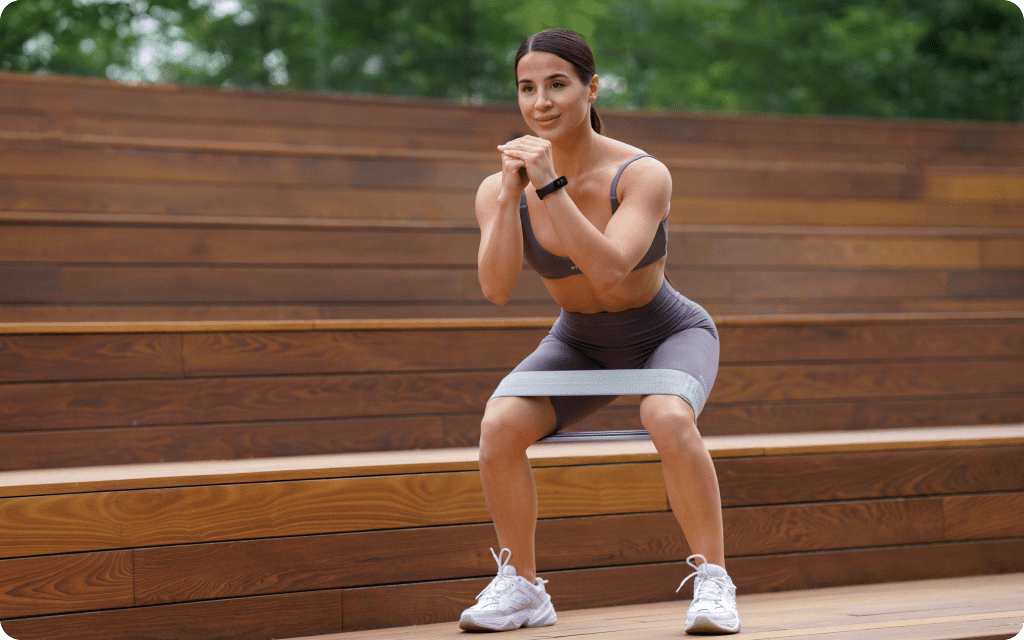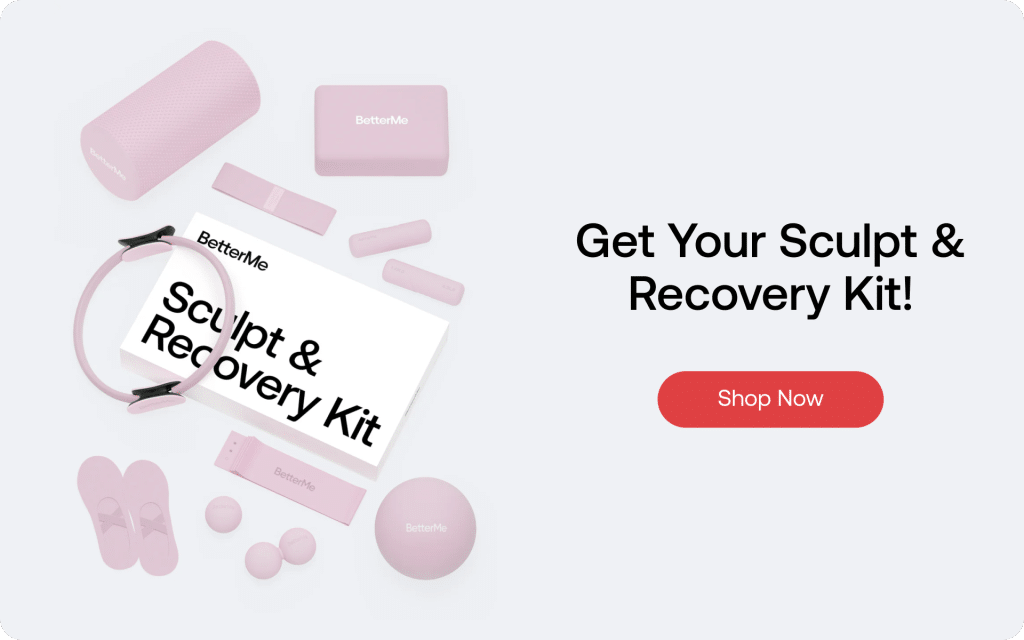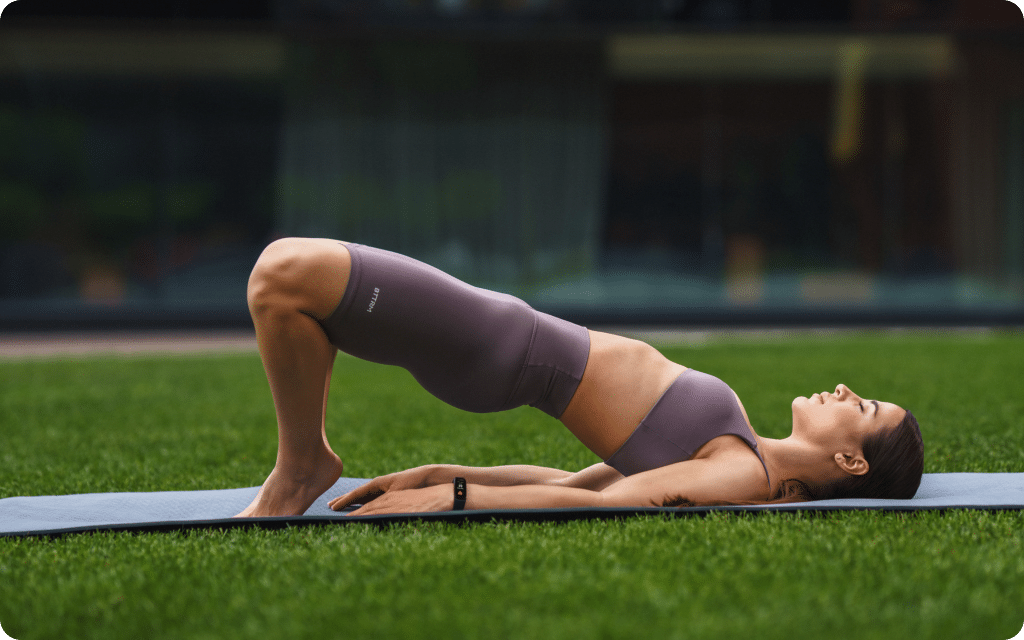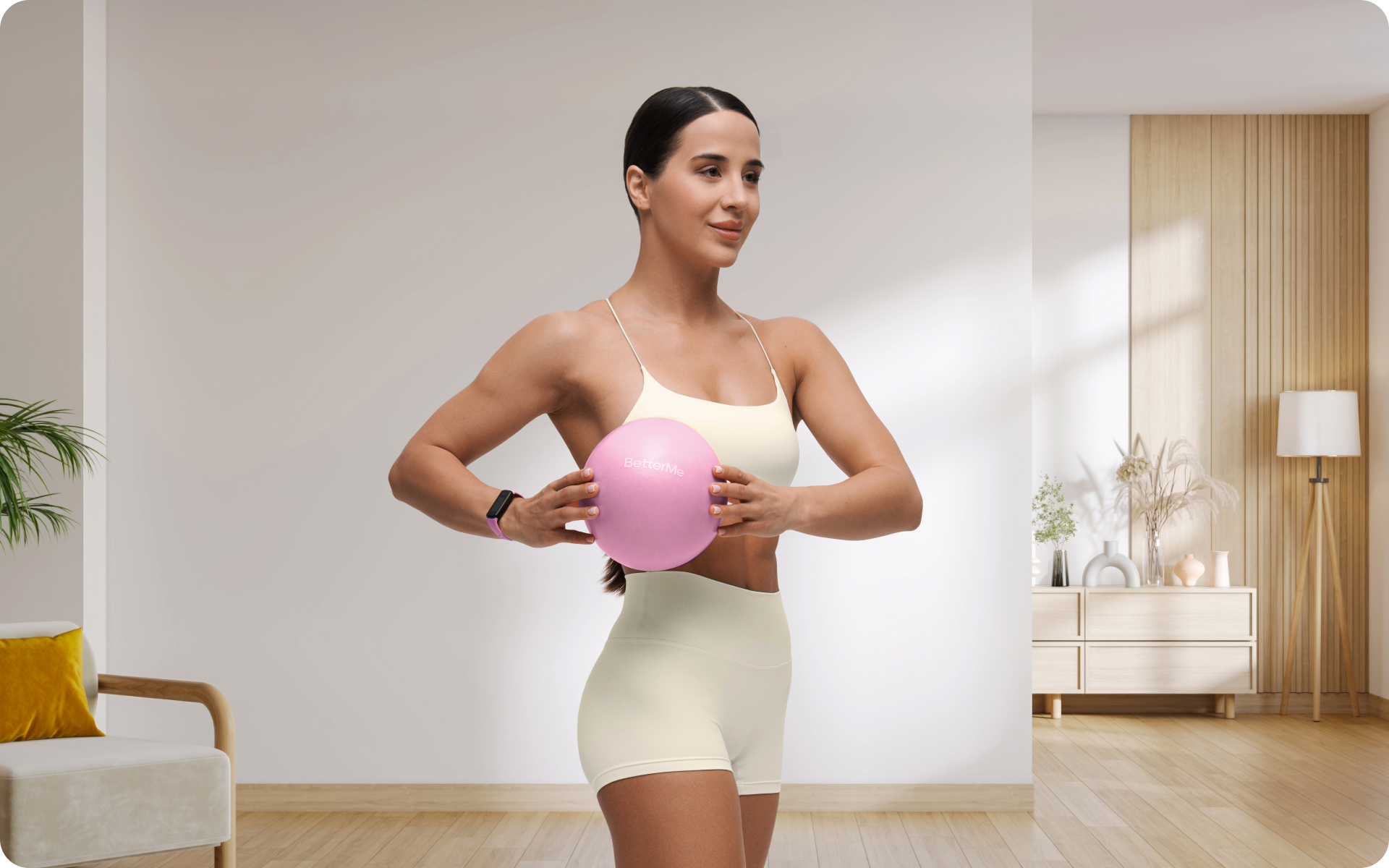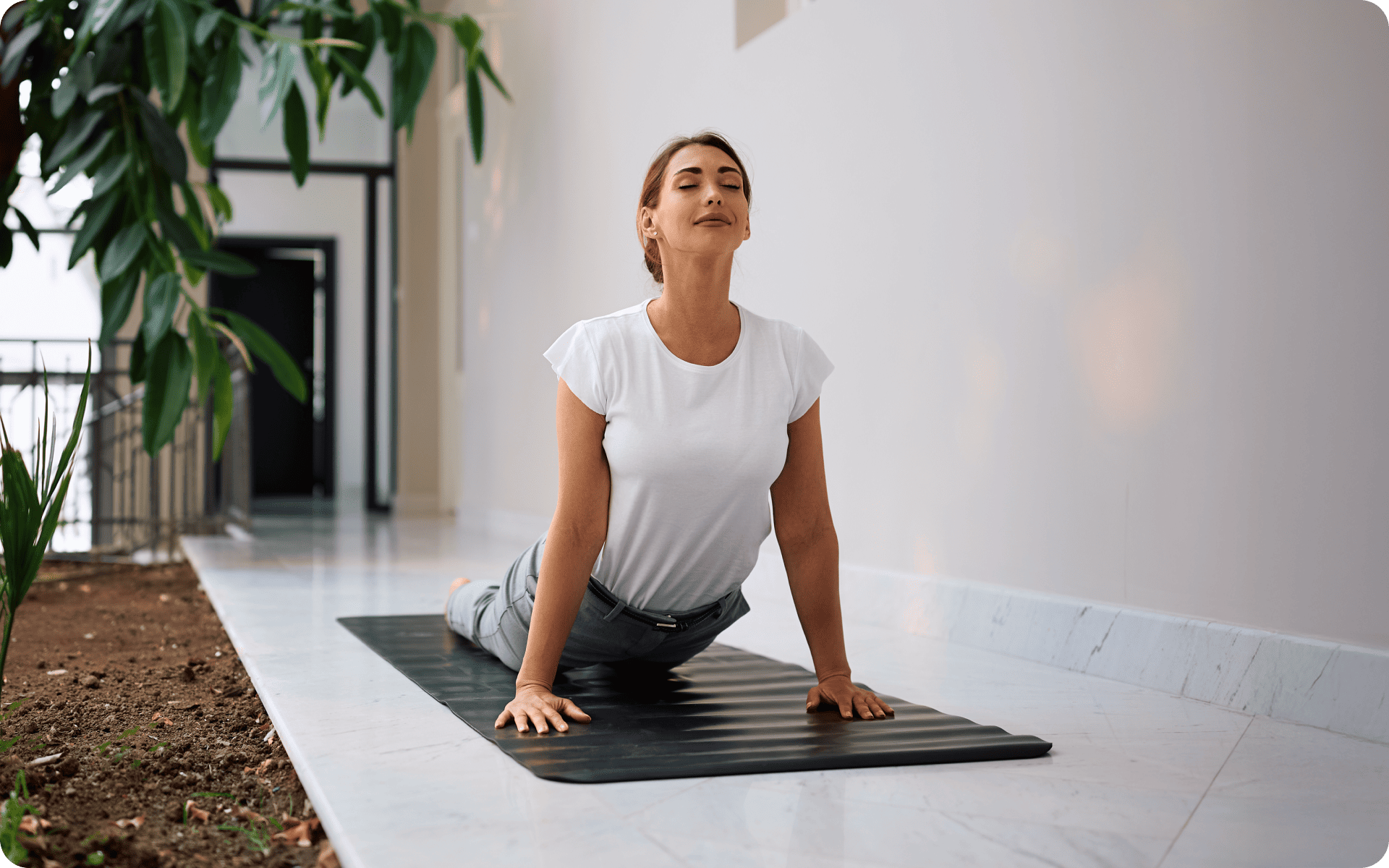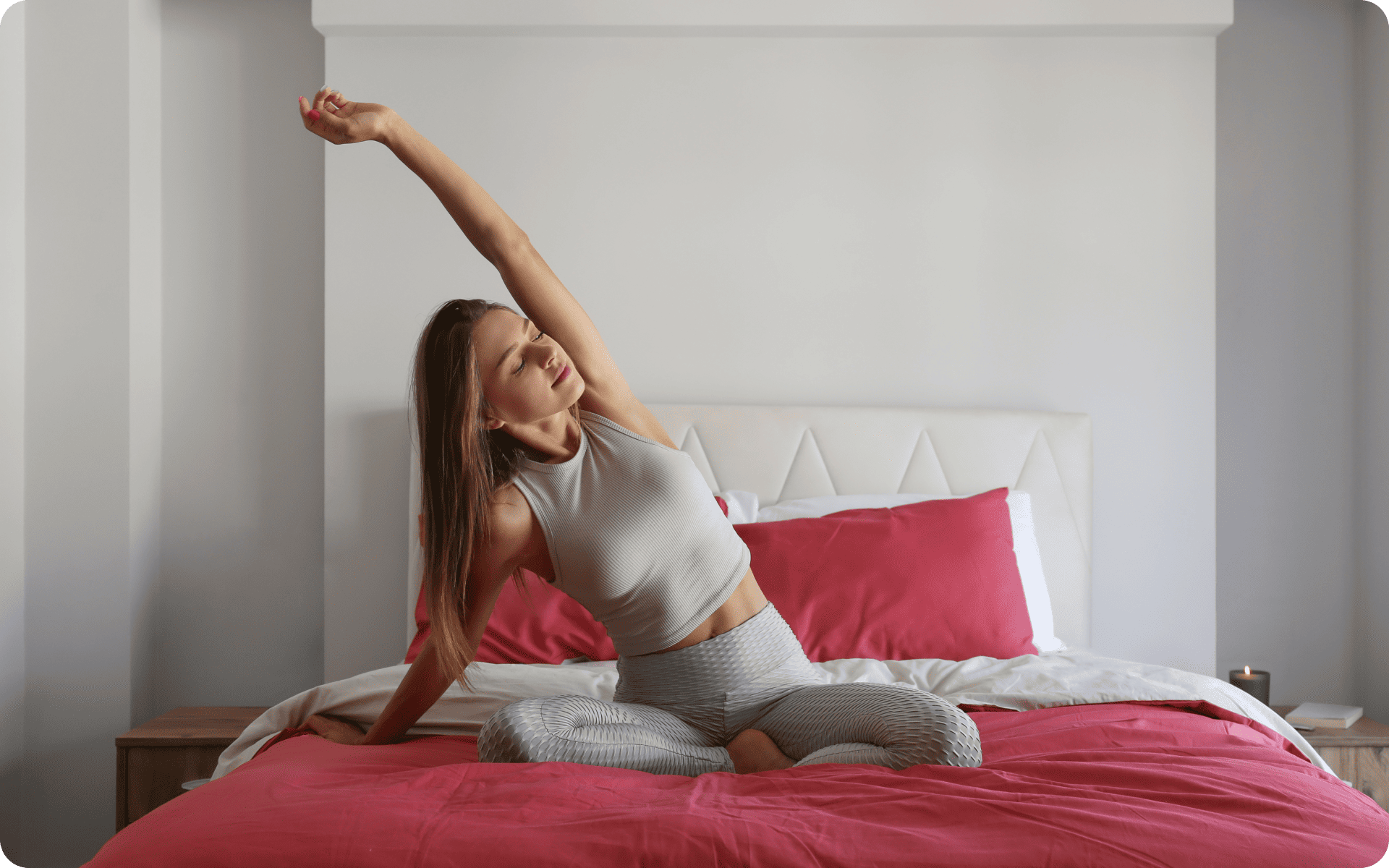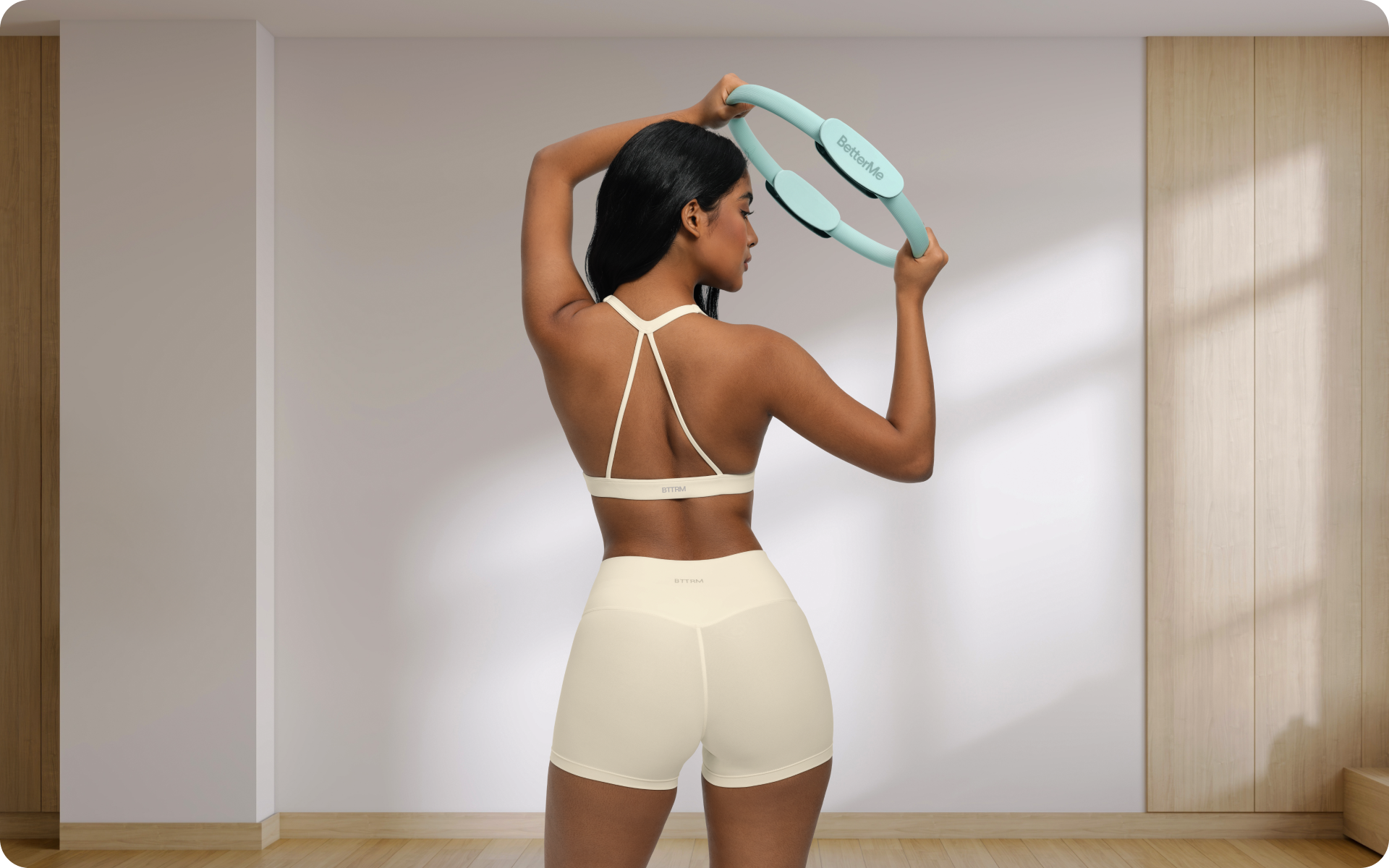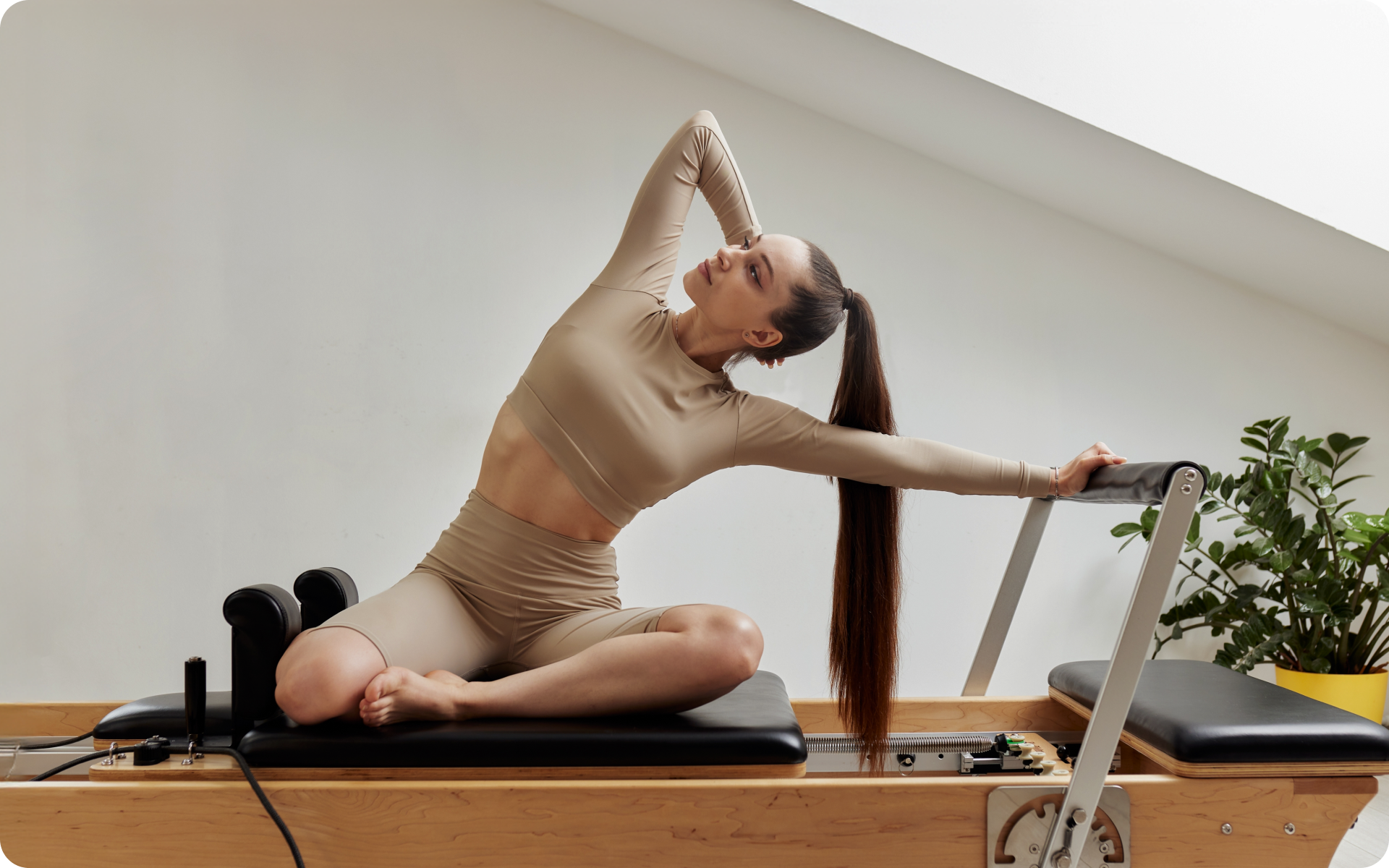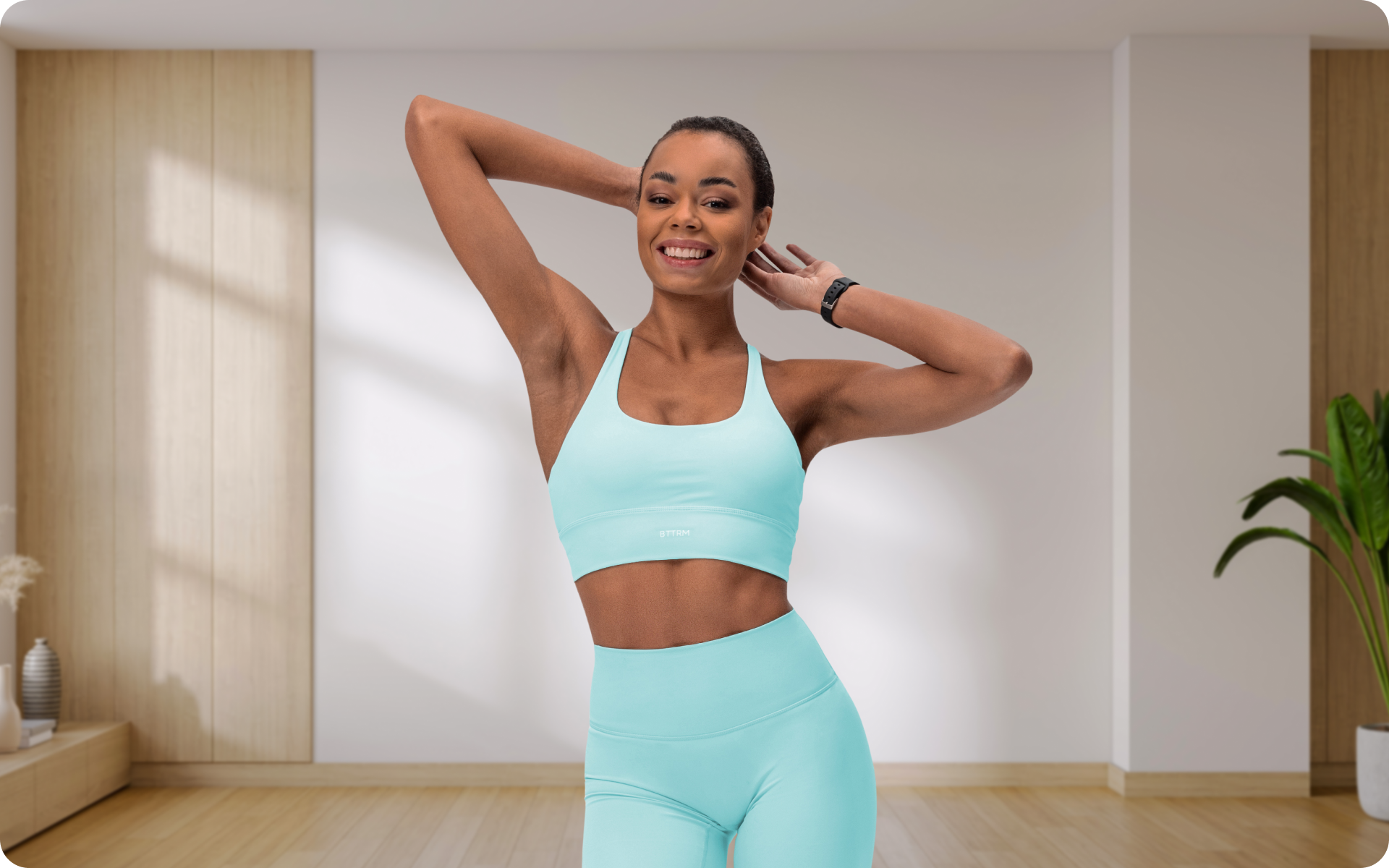Not seeing results from a workout routine can be frustrating and demotivating, especially after you’ve put in the time and effort. This is especially true for Pilates, where the promise of a toned, lean body is often one of the main motivations for starting the practice.
But how long does it actually take to see results from Pilates? The answer depends on various factors such as your current fitness level, consistency in practicing, and your diet. We’ll break down these factors and help you get a better understanding of what to expect from your Pilates journey.
How Often Should I Practice Pilates to See Results?
According to the National Center for Biotechnology Information, engaging in regular Pilates exercises for one hour per session, over a period of 12 weeks, can result in significant improvements in abdominal and lumbo-pelvic stability, flexibility, and muscular activity (1).
Regular Pilates practice can typically be classified as at least 2-3 days per week for most people. However, this is just a general guideline and may vary, based on individual factors such as:
Fitness Level
If you’re new to Pilates or have never exercised regularly before, it may take longer for you to see results compared to someone who is already physically fit. This is because your body needs time to adapt and build the necessary strength and flexibility required for more advanced Pilates movements.
Consistency
Consistency is key when it comes to seeing results from any workout routine, including Pilates. It’s important to establish a regular practice schedule and stick to it in order to see progress. Skipping sessions or practicing sporadically may delay your results.
Diet
While Pilates can provide great benefits on its own, it’s important to also maintain a healthy and balanced diet in order to see optimal results. This means fueling your body with nutritious foods that provide the necessary energy and nutrients for muscle growth and recovery.
Age
Age can play a role in how quickly you see results from Pilates. As we age, our bodies may take longer to adapt and build strength compared to younger individuals. However, this doesn’t mean that older individuals won’t see great improvements as they progress in their Pilates practice!
Progressive Overload
Another important factor to consider is progressive overload, which involves gradually increasing the intensity, duration, or difficulty of your Pilates workouts to continually challenge your muscles. This is essential for continued improvement and avoiding plateaus in your fitness journey (2).
Adding more advanced exercises, increasing the number of repetitions, or using resistance bands are ways to incorporate progressive overload into your Pilates routine. By continuously challenging your body, you ensure steady progress and more noticeable results over time.
For more details about home Pilates workout, take a look at our prior publication.
How Long Does It Take For Pilates To Transform Your Body?
Pilates can definitely help transform your body if done consistently and correctly. However, the amount of time it takes to see a noticeable transformation varies for each individual. Some people may see results in just a few weeks, while others may take longer. This might be influenced by:
Starting Point
If you’re starting from a relatively low fitness level, you may see quicker and more drastic changes compared to someone who is already quite fit. This is because your body is more responsive to new stimuli, and there is more room for improvement. Initially, the changes might include increased endurance, better postural awareness, and improved coordination.
Goals
The type of results you are looking for will also influence the time it takes to see a transformation. For example, if your goal is to improve flexibility, you may see results sooner, compared to someone whose goal is to build muscle strength.
Flexibility improvements can often be noticed within a few weeks of consistent practice, while building significant muscle strength may take several months. Additionally, goals like weight loss, enhanced athletic performance, or rehabilitation of an injury will each have their own timelines and challenges.
Body Composition
Body composition refers to the ratio of fat mass to lean muscle mass in your body. Depending on your starting point, this can influence how quickly you see changes in your body from practicing Pilates. For example, if you have a higher percentage of body fat, it may take longer for muscle definition to become visible.
Effort and Intensity
How much effort and intensity you put into your Pilates practice can greatly impact the speed at which you see results. Consistently pushing yourself and gradually increasing the difficulty of your workouts will yield faster and more significant progress.
It’s important to maintain proper form and technique to avoid injury and be sure that you are effectively targeting the right muscle groups. High-intensity routines combined with a balanced diet and adequate rest will maximize your gains and help you reach your fitness goals more efficiently.
Are you up for a wall Pilates challenge? Read about it in our previous article!
That being said, the transformation will happen gradually and across a timeline. This is how it might look:
Week 1-2: Initial Adjustments
In the first couple of weeks, you might start to feel more aware of your body and its movements. You may experience some muscle soreness as your body adapts to the new exercises. These early sessions are crucial for learning correct form and establishing a routine, which lays the foundation for future progress.
Week 3-4: Increased Energy and Stamina
By the end of the first month, many people notice a boost in overall energy levels and stamina. Your muscles are becoming more accustomed to the Pilates exercises, and you may find that daily activities become easier. Some people also start to observe improvements in postural awareness and flexibility at this stage.
Read more: Stamina Vs Endurance: Which Is Better And How Do You Train For Either?
Week 5-8: Noticeable Strength Gains
By the second month, you can expect noticeable increases in muscle strength and definition, especially in your core, arms, and legs. Flexibility continues to improve, and your coordination and balance may start to feel more refined. These visible changes can be motivating and encourage continuous practice.
Month 3: Enhanced Physical Appearance and Mobility
By the third month, many practitioners begin to see significant changes in their body composition. Increased muscle definition and a leaner appearance are common outcomes. Improved mobility and joint flexibility can also lead to better performance in other physical activities.
Month 4-6: Transformation and Refinement
Between four to six months, the transformation becomes more pronounced. Consistent practice has not only improved muscle strength and definition, but also cardiovascular health and overall endurance. You are likely to feel more confident in your movements and posture, with comprehensive benefits spilling over into other areas of life, including reduced stress and better mental clarity.
Intense sweat sessions, working weight loss tips, lip-smacking recipes come in one package with the BetterMe: Health Coaching app—all at your fingertips, start transforming your life now!
Month 6 and Beyond: Sustained Improvements and Long-term Benefits
From six months onwards, the changes in your body are well-established. Long-term benefits such as sustained core strength, enhanced flexibility, and improved neurological function are more pronounced. Your body adapts to the Pilates routine, making it easier to tackle more challenging exercises and further refine your physique. Commitment beyond this point will help maintain and even amplify these results, promoting lifelong health and wellbeing.
As mentioned earlier, keep in mind that your improvements come slower as you get in better shape. When you were just starting out, you were likely seeing improvements on a weekly basis because you were a blank slate. After several months and especially years of consistent hard work, you will be in excellent shape. At this point, you’ll have to work even harder to extract improvements, little by little.
Can Pilates Change Your Body Shape?
Pilates will likely have a positive impact on your body shape if practiced consistently and correctly. The combination of increased caloric expenditure, which is an important factor in weight loss, and improved muscle definition as a result of the strengthening benefits of Pilates can lead to a desirable aesthetic (3).
However, it’s important to keep in mind that every individual’s body is unique, and results may vary. Factors such as age, starting point, effort, intensity, and overall lifestyle will also play a role in how Pilates transforms your body shape.
Have you ever heard about barre workouts? Learn about the difference between barre and Pilates with our in-depth article.
Will 20 Minutes of Pilates a Day Make a Difference?
20 minutes of Pilates a day can make a significant difference in your overall health and fitness. While some may argue that longer sessions are more effective, studies have shown that consistent short bursts of exercise can yield similar results (4).
This is according to the American Council on Exercise, which states that 20 minutes of Pilates, three times a week can improve flexibility, muscle strength, and body composition (5). This is great news for busy individuals who may struggle to find time for longer workouts in their daily routine.
Our previous post goes into great detail about how to use a Pilates ring.
This sample Pilates workout fits the recommended guidelines and progressively gets more challenging:
20-Minute Pilates Workout Plan
Week 1-2: Foundation and Flexibility
Monday:
- Warm-Up (2 minutes): Gentle stretching
- Roll-Up (2 minutes): 8-10 reps
- Single Leg Stretch (2 minutes): 10 reps each side
- Criss-Cross (2 minutes): 10 reps each side
- Swan Prep (2 minutes): 6-8 reps
- Leg Circles (3 minutes): 10 reps each leg
- Spine Stretch Forward (2 minutes): 8-10 reps
- Cool Down (5 minutes): Gentle stretching and deep breaths
Read more: Dynamic Warm Up Exercises To Do Before Your Workout
Wednesday:
- Warm-Up (2 minutes): Arm circles and shoulder rolls
- Pelvic Curl (2 minutes): 8-10 reps
- Chest Lift (2 minutes): 10 reps
- Spine Twist (2 minutes): 8-10 reps each side
- Single Leg Kick (2 minutes): 10 reps each leg
- Side Leg Lifts (3 minutes): 10 reps each side
- Seal (2 minutes): 8-10 reps
- Cool Down (5 minutes): Gentle stretching and deep breaths
Friday:
- Warm-Up (2 minutes): Full body stretch
- Hundred (2 minutes): 50-100 beats
- Rolling Like a Ball (2 minutes): 8-10 reps
- Double Leg Stretch (2 minutes): 8-10 reps
- Swimming (2 minutes): 6-8 reps
- Inner Thigh Lifts (3 minutes): 10-12 reps each leg
- Saw (2 minutes): 8-10 reps
- Cool Down (5 minutes): Gentle stretching and deep breaths
Week 3-4: Strength and Endurance
Monday:
- Warm-Up (2 minutes): Dynamic stretches
- Roll-Up (1 minute): 8-10 reps
- Single Leg Stretch (2 minutes): 10-12 reps each side
- Criss-Cross (2 minutes): 10-12 reps each side
- Swan Dive (2 minutes): 6-8 reps
- Leg Circles (3 minutes): 12 reps each leg
- Plank (2 minutes): Hold for 30 seconds, rest, repeat
- Cool Down (6 minutes): Gentle stretching and deep breaths
Wednesday:
- Warm-Up (2 minutes): Jumping jacks, arm swings
- Pelvic Curl (2 minutes): 10-12 reps
- Chest Lift (2 minutes): 12 reps
- Spine Twist (2 minutes): 10 reps each side
- Double Leg Kick (2 minutes): 8 reps each leg
- Side Leg Lifts (3 minutes): 12 reps each side
- Open Leg Rocker (2 minutes): 8-10 reps
- Cool Down (5 minutes): Gentle stretching and deep breaths
Friday:
- Warm-Up (2 minutes): Jog in place, hip circles
- Hundred (2 minutes): 60-100 beats
- Rolling Like a Ball (2 minutes): 10 reps
- Double Leg Stretch (2 minutes): 10 reps
- Swimming (2 minutes): 8 reps
- Inner Thigh Lifts (3 minutes): 12 reps each leg
- Saw (2 minutes): 10 reps
- Cool Down (5 minutes): Gentle stretching and deep breaths
Month 2: Advanced Techniques and Increased Intensity
Monday:
- Warm-Up (2 minutes): High knees, torso twists
- Roll-Up (1 minute): 10-12 reps
- Bicycle (2 minutes): 10-12 reps each side
- Criss-Cross (2 minutes): 12 reps each side
- Swan Dive (2 minutes): 8 reps
- Leg Circles (3 minutes): 12 reps each leg
- Side Plank (2 minutes): Hold for 30 seconds each side
- Cool Down (6 minutes): Gentle stretching and deep breaths
Wednesday:
- Warm-Up (2 minutes): Light jogging, arm swings
- Pelvic Curl (2 minutes): 10 reps
- Chest Lift with Rotation (2 minutes): 10-12 reps each side
- Spine Twist (2 minutes): 12 reps each side
- Single Leg Kick (2 minutes): 12 reps each leg
- Side Leg Lifts (3 minutes): 12-15 reps each side
- Open Leg Rocker (2 minutes): 10 reps
- Cool Down (5 minutes): Gentle stretching and deep breaths
Friday:
- Warm-Up (2 minutes): Full body dynamic stretch
- Hundred (2 minutes): 80-100 beats
- Rolling Like a Ball (2 minutes): 10-12 reps
- Double Leg Stretch (2 minutes): 12 reps
- Swimming (2 minutes): 10 reps
- Inner Thigh Lifts (3 minutes): 15 reps each leg
- Seal (2 minutes): 10 reps
- Cool Down (5 minutes): Gentle stretching and deep breaths
Reasons why BetterMe is a safe bet: a wide range of calorie-blasting workouts, finger-licking recipes, 24/7 support, challenges that’ll keep you on your best game, and that just scratches the surface! Start using our app and watch the magic happen.
Month 3 and Beyond: Mastery and Maintenance
Monday:
- Warm-Up (2 minutes): Skipping, torso twists
- Roll-Up (1 minute): 12 reps
- Bicycle (2 minutes): 12-15 reps each side
- Criss-Cross (2 minutes): 15 reps each side
- Swan Dive (2 minutes): 10 reps
- Leg Circles (3 minutes): 15 reps each leg
- Plank with Leg Lift (2 minutes): Hold for 30 seconds each side
- Cool Down (6 minutes): Gentle stretching and deep breaths
Wednesday:
- Warm-Up (2 minutes): Jumping jacks, arm swings
- Pelvic Curl (2 minutes): 12 reps
- Chest Lift with Rotation (2 minutes): 12-15 reps each side
- Spine Twist (2 minutes): 15 reps each side
- Double Leg Kick (2 minutes): 10 reps each leg
- Side Leg Lifts (3 minutes): 15 reps each side
- Open Leg Rocker Advanced (2 minutes): 12 reps
- Cool Down (5 minutes): Gentle stretching and deep breaths
Friday:
- Warm-Up (2 minutes): High knees, dynamic stretching
- Hundred (2 minutes): 100 beats
- Rolling Like a Ball Advanced (2 minutes): 12 reps
- Double Leg Stretch (2 minutes): 15 reps
- Swimming Advanced (2 minutes): 12 reps
- Inner Thigh Lifts (3 minutes): 15-18 reps each leg
- Saw Advanced (2 minutes): 12 reps
- Cool Down (5 minutes): Gentle stretching and deep breaths
To learn more about barre Pilates, check out our in-depth article on the topic.
FAQs
Is It Better to Do Pilates in the Morning or at Night?
Both morning and night Pilates sessions have their benefits. Morning workouts can boost your energy levels and set a positive tone for the day ahead. They can also help enhance metabolism, which can be beneficial if weight management is a goal (6).
On the other hand, evening sessions can be a wonderful way to unwind and relax after a stressful day, promoting better sleep (7). Ultimately, the best time to do Pilates depends on your personal schedule and when you feel most energized or relaxed.
Is Pilates and Walking Enough Exercise?
Combining Pilates and walking can form an effective and balanced exercise routine. Pilates focuses on core strength, flexibility, and muscle tone, while walking is excellent for cardiovascular health. Incorporating both activities covers different aspects of fitness, contributing to overall health and fitness (8).
However, it’s important to consider your specific fitness goals. For those looking to build significant muscle mass or achieve higher levels of cardiovascular endurance, additional forms of exercise might be needed.
Does Pilates Tone Your Body?
Pilates is highly effective in toning your body. The exercises target various muscle groups, particularly the core, and work on strengthening and elongating muscles (3). With consistent practice, Pilates can lead to a more toned and well-defined physique. It also improves overall posture, which can enhance the appearance of muscle tone.
Is 30 Minutes of Pilates a Day Enough?
30 minutes of Pilates a day can be sufficient to achieve noticeable improvements in strength, flexibility, and overall fitness. It’s all about consistency and quality of movement rather than duration. Even with a short daily session, the benefits of Pilates can accumulate over time. However, make sure that you’re performing the exercises with proper form to maximize the benefits (9).
The Bottom Line
Seeing results from Pilates varies by individual, depending on practice frequency, fitness level, and goals. Many report improvements in strength, flexibility, and posture within 4-6 weeks of consistent practice, doing Pilates 2-3 times per week. Remember, Pilates is progressive; lasting benefits come with sustained practice and dedication. Be patient, stay consistent, and you’ll see results over time.
DISCLAIMER:
This article is intended for general informational purposes only and does not serve to address individual circumstances. It is not a substitute for professional advice or help and should not be relied on for making any kind of decision-making. Any action taken as a direct or indirect result of the information in this article is entirely at your own risk and is your sole responsibility.
BetterMe, its content staff, and its medical advisors accept no responsibility for inaccuracies, errors, misstatements, inconsistencies, or omissions and specifically disclaim any liability, loss or risk, personal, professional or otherwise, which may be incurred as a consequence, directly or indirectly, of the use and/or application of any content.
You should always seek the advice of your physician or other qualified health provider with any questions you may have regarding a medical condition or your specific situation. Never disregard professional medical advice or delay seeking it because of BetterMe content. If you suspect or think you may have a medical emergency, call your doctor.
SOURCES:
- Pilates: how does it work and who needs it? (2011, nih.gov)
- Progression of volume load and muscular adaptation during resistance exercise (2014, nih.gov)
- Effects of a Pilates exercise program on muscle strength, postural control and body composition: results from a pilot study in a group of post-menopausal women (2015, nih.gov)
- Short Bursts of Activity Can Have Huge Health Benefits (2023, uhhospitals.org)
- Pilates: Health Benefits, How to Get Started, and How to Get Better (Everyday Health) (2022, ace.org)
- 5 benefits of morning exercise (n.d., piedmont.org)
- Effects of Evening Exercise on Sleep in Healthy Participants: A Systematic Review and Meta-Analysis (2019, nih.gov)
- Walking and Pilates: the perfect partnership for your health (n.d., raisepilates.com)
- Exercise Biomechanics for Health: Evaluating Lifelong Activities for Well-Being (2023, nih.gov)
